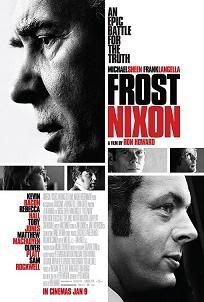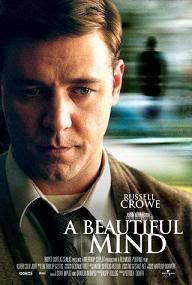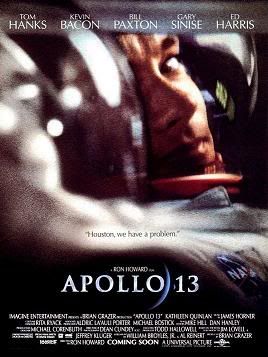The format for tonight's Friday Night at the Movies will be a little different than usual, focusing on the work of a single filmmaker. I'll try to say things provacative enough (or at least stupid enough) that there is stuff to talk about in the thread.
According to a common cliche about film, film is incapable of conveying even a single idea. I was reminded of this cliche after finally watching "Frost/Nixon" via Netflix recently. It occured to me that Ron Howard's career as a film director seems to be devoted to proving the cliche correct.
Is there a single serious movie director in Hollywood -- by which I mean a non-Michael-Bay -- more frustrating than Ron Howard? Time after time he picks a story or a subject matter for his next movie that should be fascinating, should be thought provoking; he proposes to make a film that should provide some kind of insight into the issue at hand. But this simply never happens.
Instead, watching a Ron Howard film, one typically gets the nagging-itch feeling that some point is being rigorously missed for two straight hours. A point about the movie that is apparently lost on its maker, but that really ought to have been glaringly obvious to anyone watching the movie in pre-release, or anyone watching the dailys, or anyone working on the final edits.
It's as if it just never occurred to Howard to make a point. As a result, while watching a Ron Howard film in the movie theater one continually finds oneself wanting to shout at the screen, You're the one who brought up schizophrenia/mathematics/space exploration/Watergate to begin with, goddamn it!!! Do you have something to say on this matter or not?!?
Frost/Nixon (2008)
Who Should Have Made This Movie? George Clooney.
Why? This is a movie about people who actually thought that a television interview could replace a trial. Clooney would have been smart enough to see the abusrdity and tragedy in that. Howard, on the other hand, seemed to think that this is a story with a happy ending, in which Frost "beats" Nixon.
I mean, seriously, look at this shit. This is how this movie ends:
Reston (voice over): Despite being buried with full honours in 1994, Richard Nixon never again held public office of any kind. His most lasting legacy is that today any political wrongdoing is immediately given the suffix . . 'gate'. As for David [Frost]? New York, London and Sydney welcomed him back with open arms. He even got back his table at Sardi's. His photo would appear in newspapers from time to time. At one party or another. In his crowd of air-kissing politicians, actors and high-fliers, it was tough to tell where the politics stopped and the showbiz started.
Maybe that was the point. Maybe, in the end, there is no difference. And David understood that better than anyone.
Actually, there is at least one minor difference between politics and show business, and one that was noted by this same character, Reston, earlier in the film. Politicians, Presidents of the United States, anyway, have the power to kill millions of people. A power that Richard Nixon used in Viet Nam and Cambodia.
But, you know, never mind. It was fun watching Frost get the best of Nixon for a moment on TV, thus proving all is well in America.
A Beautiful Mind (2001)
Who Should Have Made This Movie? David Fincher.
Why? Fincher has an actual interest in and facility for visual depictions of mental distress. The meaningless paranoia of Zodiac would have served A Beautiful Mind well, as would the way everyone but Jack seems crazy in Fight Club . . . until the film reveals that he is the one who is crazy. Those are actual feats of visual story-telling. Howard can do no better than have Russell Crowe yell at actors playing people who are not really there, while other actors, playing people who are really there, look on with concern.
The other aspect of A Beautiful Mind, mathematics, might be one of those topics, like chess, perhaps, that is simply undoable on screen. I have no idea who could make a film about the ideas of a nobel prize winning mathmetician. I do know that the only person I would less like to see try to do this than Ron Howard is Robert Zemekis.
Apollo 13 (1995)
Who Should Have Made this Movie? Stanley Kubric or Ridley Scott or James Cameron or Steven Spielberg or anyone but Robert Zemekis.
Why? Any one of them would have used this event, one of the most amazing events in human history, to make a film that was more than an expensive after school special.
This is one of those movies where you can tell how much or how little a director trusts the story by how much time is devoted to the spouse or partner of the main character. You can tell Tony Scott trusts the story of "Crimson Tide" because he has Denzel Washington say goodbye to his wife at the start of the film and then we never see her again -- the rest of the movie is in the submarine. Howard, not content merely to waste our time with long scenes proving that Jim Lovell's wife loves him, manages to drag in his grandmother.
Actually, though, with the exception of "Splash," Apollo 13 is my favorite Ron Howard film, because it does not seem to be relying upon our hopes for a deeper, better story that never materializes. The story that Howard tells about Apollo 13's peril and safe return is not deep, but it is exciting and it is very well, as in competently, done.
If only Howard would content himself with that in all of his movies, I would not find him so maddening. Oh well. At least he's not Robert Zemekis.
Update
I forgot! FNATM is looking for new writers. If you'd like to write a diary or ten about movies and your love of them, please drop us a line at FNatM@live.com. Thanks!





















